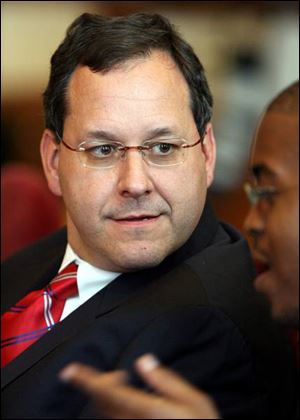
Ohio justices hear claims about Taft memos
11/10/2005
Sen. Marc Dann
COLUMBUS - In a case that could have a dramatic effect on Ohio's public records law, an attorney representing Gov. Bob Taft yesterday told the Ohio Supreme Court that the governor has the power to withhold all memos written by high-ranking aides from citizens and the press.
During oral arguments that included references to lawsuits involving former President Richard Nixon and Vice President Dick Cheney, attorneys representing Mr. Taft and state Sen. Marc Dann, a Democrat from the Youngstown area, clashed on the issue of whether Ohio's governor has "executive privilege." That is the principle that a government official can't be forced to disclose confidential communications if that disclosure would harm how the government operates.
"This is an important right not just for one governor, but for all governors,'' said Kathleen Trafford, the special counsel representing Mr. Taft.
"There's no reason to go where the governor wants to go, which is it's all protected; we'll keep people from seeing it,'' said Frederick Gittes, a Columbus attorney representing Mr. Dann. "That would be a violation of the separation of powers."
In July, Mr. Dann asked the Supreme Court to order the governor to release weekly reports and other correspondence dating to 1999, which he said could shed light on the state's failed investment in rare-coin funds controlled by coin dealer Tom Noe, and why the state lost $215 million in a risky hedge fund managed by Mark D. Lay, of MDL Capital Management.
Mr. Taft's attorney yesterday told the Supreme Court that the governor's office released most of the documents that Mr. Dann requested when Mr. Taft waived his executive privilege covering weekly reports about the Bureau of Workers' Compensation.
Mr. Dann's attorney countered that Mr. Taft has released parts of memos written by Jim Samuel, a former bureau official who served as the governor's executive assistant for business and industry - but not the full contents of about 200 memos including ones written by Mr. Samuel's predecessors.
All seven justices asked questions during the 75-minute session, with Chief Justice Thomas Moyer saying if the high court does find that the governor has executive privilege, the framework of that power must be crafted carefully.
"Hopefully, we don't have a case like this one again,'' he added.
Ms. Trafford told the Supreme Court that the issue is "very narrow" - whether weekly written reports that the governor receives from his high-ranking advisers and cabinet members are public records that must be disclosed without judicial review.
"Under the Constitution of Ohio, it's the governor's right to decide whether this particular information is public,'' Ms. Trafford said.
In response to a question from Justice Paul Pfeifer, Ms. Trafford acknowledged that Mr. Taft was not arguing that the governor has executive privilege under federal law or that the Ohio Constitution says the governor has that power.
Instead, she argued that a section of the state Constitution gives the governor the right to claim that privilege to prevent citizens from gaining access to memos and other communications from high-ranking aides.
"What are the limits to this cloak of secrecy that the governor is asking us to imply?" Justice Pfeifer asked.
Ms. Trafford denied that Mr. Taft seeks a "secrecy privilege,'' saying solely memos and other communications from high-ranking aides and department directors to the governor would be withheld from the public and press.
And she said executive privilege is rooted in the separation of powers in state government and would not block inquiries from investigators, prosecutors, or a legislative probe.
"But we do have investigations going on in the state right now, and that is why these weekly reports are important,'' said Justice Alice Robie Resnick, the sole Democrat on the court. "They would determine when the governor knew what was going on in the Bureau of Workers' Compensation."
Mr. Dann later criticized the governor, saying his case still "doesn't make any sense."
"The absurd position that the governor is taking in this case is that it is solely within his discretion to decide what records are privileged and what records aren't," Mr. Dann said. "There is simply no other chief executive officer of a government in the country that has that authority."
Contact James Drew at:
jdrew@theblade.com
or 614-221-0496.